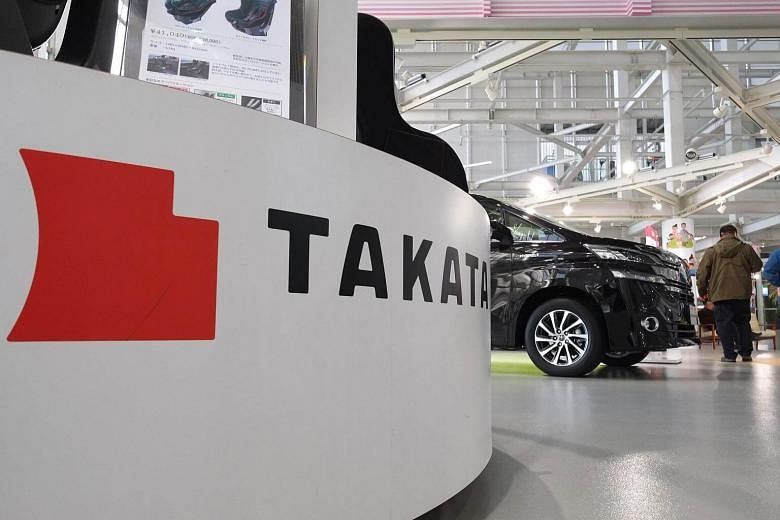WASHINGTON (AFP, BLOOMBERG) - Japan's Takata formally pleaded guilty to fraud and will pay a billion-dollar fine to settle suits over its defective airbags, the Justice Department said on Monday (Feb 27).
A Michigan court gave the green light to the agreement reached last month on the scandal at the heart of the biggest car recall in history - about 100 million vehicles worldwide.
The defect has been linked to 16 deaths and scores of injuries.
The car parts maker had agreed to plead guilty to fraud and pay US$1 billion (S$1.41 billion) to settle the issue with US regulators.
The recall of more than 100 million airbags has affected almost every major automaker: BMW, Fiat Chrysler, Ford, General Motors, Honda, Nissan and Toyota.
The problem is linked to a defect that can cause safety devices to inflate with excessive force, sending shrapnel from the inflator canister hurtling toward drivers and passengers.
Takata has admitted that from 2000-2015 it defrauded "customers and auto manufacturers by providing false and manipulated airbag inflator test data that made the performance of the company's airbag inflators appear better than it actually was," a Justice Department statement said.
"Even after the inflators began to experience repeated problems in the field - including ruptures causing injuries and deaths - Takata executives continued to withhold the true and accurate inflator test information and data from their customers."
"We hope that today's guilty plea and sentence will send a message to suppliers of consumer safety products that they must put safety ahead of profits," US Attorney Barbara McQuade said.
Under the agreement, Takata has to pay the US$25 million criminal fine and the US$125 million for victims within 30 days of entry of the plea. The US$850 million to automakers has to be paid in full within five days after closing of the anticipated sale of the company, according to court papers.
The US has also charged three former Takata executives for their alleged roles in hiding the risk since 2000. The three - Hideo Nakajima, Tsuneo Chikaraishi and Shinichi Tanaka - are Japanese citizens who worked at Takata until about 2015, according to court papers.
Takata has also been sued by dozens of drivers and passengers in the US claiming shrapnel injuries caused by the bags. The lawsuits allege that the company knew the air bags could fail, hid negative test results and stalled recalls.
The company is also facing complaints by injured plaintiffs who allege that the propellant can cause excessive-force deployments, often in low-speed collisions, without releasing shrapnel. Most of the shrapnel cases have been settled, according to court filings reviewed by Bloomberg News.
Most of the injury and death lawsuits are combined before a Miami federal judge, who is also handling car owners' claims for economic losses related to the defects and recalls. Lead lawyers for the combined suits claimed Monday that Honda Motor, Toyota Motor and other automakers bought Takata air bags for years despite knowing they could rupture and injure people.
Honda denied the claims. "The suggestion that Honda chose to use Takata air bag inflators - despite knowing of the risk of rupture - because they were less expensive than other inflators is categorically false,'' the company said in a statement on Monday.
Brian Lyons, a Toyota spokesman, declined to comment on the allegations.
Takata's guilty plea removes another obstacle to the company's sale as it seeks a financial savior to help it complete the car recall.
The focus for Takata and prospective buyer Key Safety Systems Inc is now on whether to restructure the manufacturer through a court-mandated bankruptcy in Japan, a major bone of contention in the sale. Takata is aiming to sign an agreement with the successful bidder by March, people familiar with the discussions have said.
Key Safety Systems, a Michigan-based air bag manufacturer that's owned by China's Ningbo Joyson Electronic Corp, was preferred over Sweden's Autoliv Inc as the bidder for Takata because a sale to the Chinese-owned company would have fewer antitrust concerns, people familiar with the matter have said.
Key Safety is also open to the option of letting Takata avoid a court-mandated restructuring in Japan, even though the preference is still for a court-directed process, a person familiar has said.

